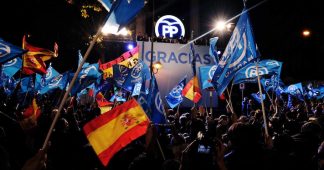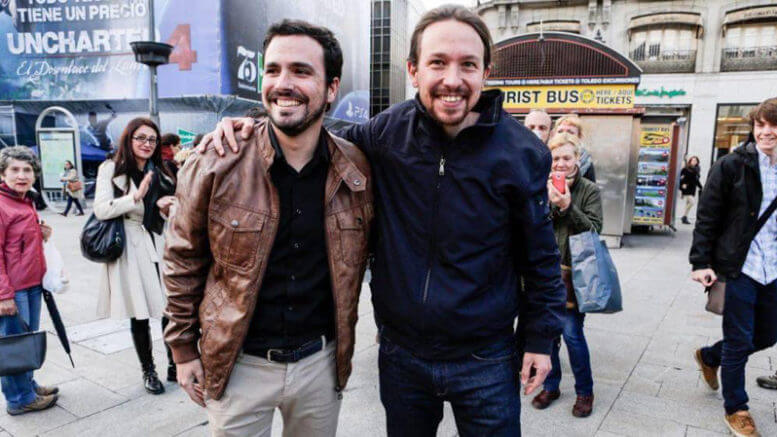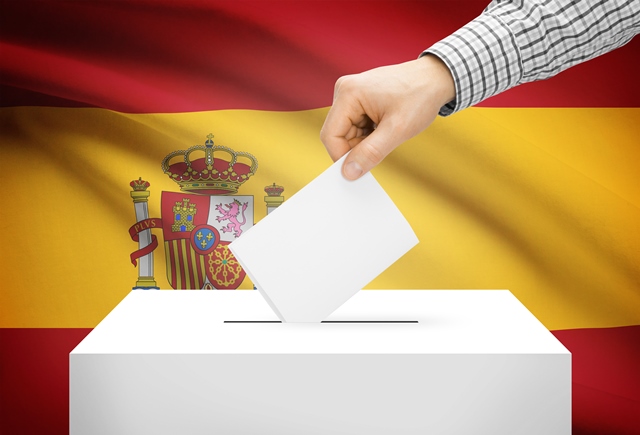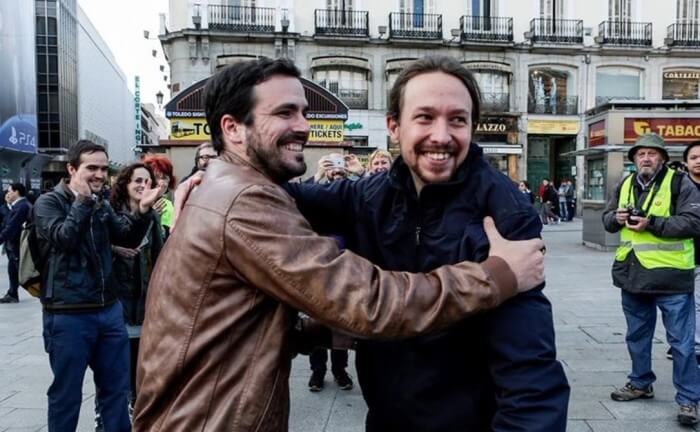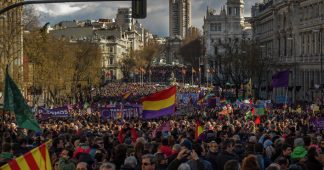General elections in Spain: instability, volatility and radicalisation
by Arturo Rodriguez
On Sunday 20 of December, Spaniards are called to the polls in what is set to be a momentous election. These are possibly the most important elections since the fall of the Franco dictatorship in 1975.
Four parties, the PP, PSOE, Ciudadanos and PODEMOS, are contending for power in a fragmented political arena. A sharp radicalisation has taken place in Spanish society. The best political expression of this radicalisation has been PODEMOS, a left-wing party created in February 2014 that a few months later was topping opinion polls, and which now stands as a serious contestant for power.
Indeed, despite the stagnation that PODEMOS experienced over the summer and the autumn, when many voices declared that the party had exhausted its potential, it has now been resurrected and is competing for the third or even the second place in the polls. These sudden turns in the political situation are characteristic of our epoch and reflect the sharp changes in the consciousness of the masses under the hammer blows of the crisis of capitalism. Whatever the results, instability and volatility will be the norm in the coming period.
Four years of class struggle
These elections come after four years of mass movements, where millions of people took to the streets to protest against austerity and the government and to defend their livelihoods. The indignados movement of 2011, the mareas of public sector workers and the public who use those services against privatisation and cuts in education and health, the heroic struggle of the coal miners in 2012, the anti-evictions movement, the general strike of 2012 and the wave of wildcat strikes, and the dignity marches of March 2014, have all seen millions of people awaken to political life and step forward to seize control over their own destinies.
In 2013 125 demonstrations took place on average every day, and 25% of the population claimed to have participated in some form of protest. If there is a key characteristic that makes the current situation in Spain exceptional it is that the masses have entered the scene once again, in a way that had not been seen since the 1970s.
As Trotsky said, “In ordinary times the state, be it monarchical or democratic, elevates itself above the nation, and history is made by specialists in that line of business – kings, ministers, bureaucrats, parliamentarians, journalists. But at those crucial moments when the old order becomes no longer endurable to the masses, they break over the barriers excluding them from the political arena, sweep aside their traditional representatives, and create by their own interference the initial groundwork for a new regime.”
These four years of crisis and mobilisation were a hard school for the masses. Indeed, the process of mobilisation was not only quantitative, drawing new layers of people into the struggle, but also qualitative, and saw an evolution in the consciousness of the population.
Two key conclusions were drawn in the course of these mass movements. The first is that the problem is not just this or that unfair law or the corrupt politician of the day, but that the system as a whole is rotten and has to be changed root-and-branch. Thus, we saw the vague demands of the indignados of 2011, concerned mostly with democratic issues and with the reform of the electoral law, evolve into the sharper and more class-based demands of the marchas de la dignidad in March 2014. Here the slogans dealt with democratic but also with social and economic issues. In this round of protests, which gathered as many as two million people on the streets of Madrid, the central catchphrase was ¡pan, techo, trabajo! (bread, housing, jobs!) and the extremely advanced slogan ¡la economía en manos del pueblo! (put the economy in the hands of the people!).
The second conclusion that was drawn in the course of these mass movements was that in order to change things it was not enough to protest in the streets and squares, but that the struggle had to be given a political expression and, ultimately, that power had to be taken by the people. This idea crystallised with the rise of SYRIZA in Greece after 2012, which was followed with much interest and expectation in Spain.
The rise of PODEMOS
The volatility of the consciousness of the masses was expressed by the rapid rise of PODEMOS in the spring of 2014. This new party, created by a small group of university professors and activists at the end of January 2014, quickly became a focal point for the discontent and the desire for radical change that existed in Spanish society.
PODEMOS obtained 1.2 million votes (8%) in the EU elections of May 2014. By the end of 2014 they were topping the opinion polls. In a few months, their membership grew to over 300,000. A political rally held by PODEMOS in Madrid in January 2015, without any particular demands, was able to gather some 300,000 people. In the local elections of May 2015, the “people’s unity” lists sponsored by PODEMOS with a variety of other left forces and anti-austerity campaigns won in key capital cities like Madrid, Barcelona, Zaragoza, Cádiz and Coruña.
How was all this possible? Such a sudden rise of a new mass party is not common in history. The working class has historically tended to move first through their traditional organisations, as happened in the revolutionary processes of 1918-1920, the 1930s and 1970s. However, on this occasion, the radicalisation was extremely sharp and sudden and the traditional leadership of the left and the labour movement, namely the United Left and also the trade unions, were lagging far behind events and, due to their mistakes and episodes of opportunism, had lost legitimacy among some of the newly politicised layers. They thus left a vacuum that was filled by PODEMOS, which had the charismatic figure of Pablo Iglesias at its head. The meteoric rise of this new party bears witness to the radicalisation of the population and the sharp turns inherent in the situation.
PODEMOS was able to connect with the desire of grassroots participation that had emerged in the struggles of 2011-2014 by organising the party on the basis of the círculos, local groupings for debate and decision-making. The language of Pablo Iglesias also chimed with the widespread radicalisation that existed. It is common to hear that PODEMOS became popular because it watered down its rhetoric. The opposite is true, as a matter of fact. PODEMOS used a very simple but sharp language, popularising terms such as “el régimen” (the regime) or “la casta” (the caste) which expressed the class hatred against the elites and their political representatives.
The fact that PODEMOS’ success was born out of their radicalism rather than out of some supposed moderation is vindicated by the evidence. In the autumn of 2014, when the party was on the rise, opinion polls showed that most people placed PODEMOS as the most left-wing party in the political spectrum. Even the voters of the United Left placed it further to the left than their own party! Pablo Iglesias himself seemed to recognise this when, in a series of articles written in May 2015, he said that PODEMOS should be “the party of the popular classes” and must attain hegemony through a “rough, class-based language” based on the idea not only of political reform but of “economic democracy”.
Months of stagnation
The seemingly untrammelled rise of PODEMOS gradually came to a halt in the spring and the summer of 2015. The party went from leading the polls, with over 25%, to taking fourth place behind the PP, PSOE and Ciudadanos, with some polls giving the party as little as 10%.
This can be explained by several factors. Firstly, the impact of Tsipras’ capitulation in Greece came as a heavy blow for PODEMOS. Pablo Iglesias supported Tsipras uncritically and stated that in his situation he would have done the same thing. Understandably, the average voter who might sympathize with PODEMOS asked him or herself, why vote for PODEMOS when their sister party in Greece has not been able to change anything, and has provoked unnecessary chaos just to return to even worse austerity than before? The capitalist mass media as well as the PP and PSOE stressed this point repeatedly.
Another important reason was the growing moderation of PODEMOS. The party watered down its programme, abandoning or nuancing some of its initial proposals, such as the nationalisation of energy companies or the reduction of the retirement age to 60. Its language and style became more conciliatory.
This turn to the centre was confirmed by the endorsement of Tsipras’ capitulation. This growing moderation reflected the efforts by the leadership of PODEMOS to make an ambitious reformist programme palatable to the capitalists, who through their media mouthpieces had been hammering away at the “infeasibility” of PODEMOS proposals. The attempt to develop an anti-austerity programme agreeable to the capitalists, however, is an impossible task that puts one on a slippery slope leading to ever greater concessions, as we have dramatically witnessed in Greece.
Behind this moderation there was also a conscious attempt by the leaders of PODEMOS to try to win over the so-called more “moderate” layers of the middle class and the working class. However, trying to convince the middle class through an ambiguous language and by avoiding taking positions on controversial issues is counterproductive: this only provokes suspicion among the conservative sectors of the population, that see the party as vague and unconvincing. Focusing on democratic questions and on issues such as corruption also leaves space for right-wing populist parties like Ciudadanos, that feel at ease over these issues but would be quickly cornered with a class-based discourse focused on social and economic problems. Conversely, this moderation demoralises and confuses the more combative layers of the working class and the youth that form the backbone of PODEMOS.
An additional cause for the stagnation of PODEMOS was the bureaucratisation of the party, which saw an ossification of internal debate and an emptying out of the círculos. The bureaucratisation of the party was not unconnected to the watering down of the party’s discourse. The strategy of not taking positions on controversial issues stifled political discussion and benefited those who were prepared to toe the line of the leadership diligently.
All the emphasis was on the idea of online participation as opposed to issues being discussed and decided democratically in the círculos. In the end only a small fraction of those registered even bothered to participate in the online plebiscites. Pablo Iglesias also made mistakes of a sectarian character, such as harshly rebuking the idea of an electoral coalition with the United Left, which still conserves important political capital through its charismatic leader, Alberto Garzón. This made many people see Pablo Iglesias as an arrogant leader, and his approval ratings consequently fell in opinion polls.
PODEMOS also faced problems that were largely beyond the party’s control. The right-wing populist party Ciudadanos was artificially inflated by the bourgeois media and by big business, that has been financing it for months to counterbalance the influence of PODEMOS. As the head of Banco Sabadell, one of the biggest Spanish banks, put it a year ago, Spain needed a “right-wing PODEMOS” – and it came in the form of Ciudadanos, very much as in Greece To Potami was summoned out of thin air as ballast against SYRIZA. This is not an entirely new party: it has been in the Catalan parliament for almost ten years, where it has consistently voted in favour of reactionary legislation and has been the loudest representative of Spanish nationalism. Indeed, the party and its leader, Albert Rivera, who now pose as moderate “centrists”, have had shady connections with the far right in the past.
Another thorny issue for PODEMOS was the Catalan national question. This became a particularly hot issue in September, with the Catalan elections. These elections, which were given the character of a plebiscite on independence, were marked by polarisation along national lines. PODEMOS, which stood on an overall correct, but at times ambiguous, platform of defending the right to self-determination, fell between the stools. It obtained an unimpressive 8.9%. The constant attacks against independence not only by the Madrid government, but by big business, the EU and even the United States, gave the nationalist camp an aura of being rebellious that drove many workers and youth to vote for the pro-independence parties. The best expression of this rebellious strand in Catalan secessionism is the CUP, which was able to capture this progressive, anti-establishment vote to the detriment of PODEMOS.
A new turn: December 2015
The electoral climate before the general election, however, began to change things. This turn in the political mood was foreshadowed by a series of mobilisations in the autumn. After a relative ebb in the mass movements, there was a large protest against gender violence on November 7, where the mood was militant and solidly left-wing, connecting gender violence to austerity and to the reactionary policies of the government. Then on November 28 there were demonstrations against military intervention in Syria.
However, it was the approaching elections which really made people begin to talk politics again. It was the time to think about the different parties and what they stand for, to take stock of the events of recent years and to think about the prospects for the country. The electorate began to assess each party more closely, to the effect, for instance, that the ratings of the PSOE began to fall as memories of the previous Zapatero government came back, while many began to see the reactionary core under the glittery surface of Ciudadanos. More importantly, the image of PODEMOS as the real vehicle for radical political change in Spain was recovered.
This tendency has been helped by a series of TV debates, where Pablo Iglesias has by far outshone his opponents. The popularity of TV debates is a noteworthy fact in and of itself, that reflects the politicisation of the population. The last debate, with representatives from the four main parties, had an audience of over nine million, comparable to a Barcelona-Madrid football match! In these debates, the PP has been trying to hide its remarkably uncharismatic and unpopular leader Rajoy away from the cameras, and, generally, to make as little noise as possible lest they provoke the left-wing electorate.
Ciudadanos, which had played on its haziness, has been forced to take a position on the different issues and the right-wing character of the party has been revealed. Indeed, opinion polls show that people have ceased to see Ciudadanos as a “centre” party, as was the case a few months ago, but now see it as a squarely right-wing formation. The last media appearances of its leader, Albert Rivera, have been underwhelming.
However, the real underdog has been the PSOE. Completely detached from the mood on the streets, they have been campaigning against PODEMOS on a hysterical right-wing platform. Their new leader, Pedro Sánchez, a Renzi-type careerist, has been accusing PODEMOS of drawing inspiration from the Soviet Union and of being closet ETA supporters.
In contrast to all the others, Pablo Iglesias stands out as a down to earth politician, the only normal person among a host of professional politicos, with a confident, sharp and appealing style. Iglesias has also been returning to the aggressive language of PODEMOS in its early days. His closing speech in the last TV debate asked the audience to remember the cuts to healthcare and education, all the corruption scandals, the new labour laws, the evictions, but also to think of the indignados, of the anti-eviction pickets, of the resilience of the unemployed and the overexploited workers, the elderly pensioners and the women workers doing a double shift, and to smile because we can change things.
References to socialism and the working class have returned to his speeches. In a very successful electoral add, Pablo Iglesias frontally challenges the owners and CEOs of big banks and corporations. He calls out by their names the managers of JP Morgan and RBS, and invites them to debate him publicly, since it is they who are really standing behind the other candidates and who have been pulling the strings in Spanish politics.
Even if the programme of PODEMOS has been watered down, it still contains important points that, if implemented, would massively improve the living standards of the population: an end to evictions, doing away with the new labour laws, a rise the minimum wage, putting a cap on energy prices, providing a basic income to families in need, ending cuts to healthcare and education, doing away with repressive laws like the ley mordaza, revising the agreements with the Vatican, cutting the wages of politicians, etc.
The political capital of PODEMOS has also been significantly increased by incorporating well-known activists from outside its orbit (and some of them standing to its left) such as Xosé Manuel Beiras, Mónica Oltra and, above all, Ada Colau. She became famous in the anti-evictions movement and went from being beaten up by the police on picket lines to becoming the mayor of Barcelona. She is far from being a classical left-wing politician: she is a working-class activist that is closely connected to the mood on the streets. Colau is a central character in the situation and will undoubtedly play an important role in the future of the Spanish revolutionary process.
Her presence is particularly important for the campaign in Catalonia. The negative tendency for PODEMOS in this region has been reverted, and it is now topping the polls under the electoral front En Comú Podem, which gathers together other left parties and social movements. This time, the rhetoric on the national question is unambiguous: PODEMOS stands for a binding referendum on independence, and will make it a prerequisite for any government pacts after the elections. It is significant that the biggest share of votes from supporters of the CUP, which is not standing in these general elections, will go for En Comú Podem rather than for other nationalist parties, whose prospects are in fact unimpressive.
Also in Galicia a broad electoral front has been established including, amongst others, Podemos, the Galician United Left and the Galician Left Nationalists of Xosé Manuel Beiras. Under the name of Marea they are now challenging the PSOE for the position of largest left party and could even get their own group in the Spanish parliament. In Valencia, where PODEMOS has reached an alliance with Compromís, the coalition is also fighting for the second position, behind the PP. These examples (Catalonia, Valencia, Galicia), show that if a broad alliance around Podemos and United Left could have been agreed, the resulting force could be now fighting for the first place. Lessons will have to be drawn.
PODEMOS rallies, despite being held indoors, are gathering thousands and displaying an enthusiastic and combative mood. The rally in Palma de Mallorca had an attendance of 5,000, that of Zaragoza 7,000, and the latest one in the Caja Mágica of Madrid 12,000, much more than those of the PP, the PSOE and Ciudadanos. There have been long queues to get into the venues and even cases of people spending the night outside to get a good place. The makeup of those participating in the rallies also includes growing numbers of young people. Reports from the comrades of Podemos por el Socialismo, promoted by the Spanish section of the International Marxist Tendency, speak of people eager to buy revolutionary literature at the entrance to the rallies.
The catchphrase of PODEMOS campaign is now remontada (upturn or takeover). This seems correct. The polls from the past few weeks have given the party a steadily increasing share of the vote, going from 10-15% a few months ago to around 20% now. This is important, because in the fragmented Spanish political scene, where four parties are vying for power, a small upswing can bring victory. Although this is improbable, and the most likely scenario is a narrow victory for the PP, PODEMOS could well overtake the PSOE and Ciudadanos. It is also worth noting that the United Left is set to win around 5-6% of the ballots, which means that the radical left gathers the biggest share of the vote. The generalised politicisation of the Spanish population will be expressed in what is predicted to be the highest participation since 1982, of around 80%.
Instability and political crisis
What is the prospect for the next government? Even if PODEMOS were to win, it would be with a simple majority, not an absolute one, and it would be virtually impossible for it to form a government. There has been occasional talk of a potential PODEMOS-PSOE alliance, but this seems extremely unlikely both numerically and politically. It is probable that some form of shaky bourgeois government agreement will be reached. The PP and the PSOE still conserve some electoral weight, particularly among the ageing population of rural areas. These small constituencies, like Zamora, Palencia, Badajoz or La Rioja, are favoured by an electoral law that was designed in the 1970s to hold back the working class of the big cities. These provinces are assigned a number of seats that is out of proportion to the size of their populations. While the two traditional parties are set to perform poorly in cities like Madrid, Barcelona, Valencia, Zaragoza or Coruña, they will capture much of the small-town vote, which will give them a disproportionate parliamentary representation.
A pact for a bourgeois government can take many forms, a PP-Ciudadanos coalition (which at the moment might not even get an overall majority), a PP government supported from outside by Ciudadanos or by the Basque right-wing nationalists, etc. If the bourgeois parties do not get enough votes, however, it might become necessary to bring the PSOE into any potential agreements. This would put it under enormous pressure and would throw it into a crisis, and the belief that this is still a left-wing, progressive force would finally be dispelled. A bad result for the PP and Ciudadanos might also bring the right-wing Catalan nationalists of CDC into the scene. Despite their recent anti-Madrid rhetoric, they have traditionally been used as a crutch to support minority PP and PSOE governments, and we cannot rule out that they might be pressed to do this yet again – which would also throw this party into a deep crisis. That these parties may have to be brought into an unholy pact with the PP and Ciudadanos is entirely possible. The latest GESOP poll gives a potential PP-Ciudadanos alliance as little as 161 seats, 14 away from a parliamentary majority. This political fragmentation at parliamentary level is nothing but a reflection of the class polarisation that is taking place in society at large.
Whatever the result, the most plausible perspective is for a weak bourgeois government like the ones we saw in Greece before January 2015. It will have to continue to manage the crisis of capitalism and the mountains of debt that have been amassed, and will become highly unpopular, preparing the ground for new turns to the left in society. Ciudadanos would be central to such a government, and would thus lose its varnish of being the party of “renewal” and a harbinger of “a new type of politics”.
At the same time, a positive result for PODEMOS, even a victory with a simple majority, would posit it as a genuine alternative. A good result would boost the confidence of the fighting layers of the working class and the youth, and would open up the less combative sectors of society to the idea of radical change. A strong presence in parliament would serve as a powerful platform and would position PODEMOS as the main opposition to austerity. While most of the attention of the masses over the last 18 months has been centered on the electoral arena (with the European, municipal and now parliamentary elections), it is likely that in the new year we will see a renewal of the cycle of struggles in the streets and the workplaces against an unstable bourgeois coalition government carrying out cuts.
Perspectives for the Spanish revolution
It is likely that the Spanish radical left, with PODEMOS at its head, will be pushed into power in the medium term. The leadership of PODEMOS believes that Spain will have more elbow room than Greece to implement reforms within the confines of capitalism because it has a bigger economy and is not currently subjected to a formal bailout programme. However, the economy is not in the hands of the state, but of a powerful oligarchy that will do whatever is necessary to protect their property and their privileges. In this they will have the support of their media empires, of international capital and the EU, which is terrified at the prospect of having a left-wing government in the fourth economy of the eurozone. And, even if Spain is not on a formal bailout programme, it borrows most of its money from Spanish banks. In other words, a left-wing government will immediately be put on a collision course with Spanish and international capitalism.
Even a programme for limited reforms like that of PODEMOS will be blocked from day one. Moreover, the tasks of the Spanish revolution will be complicated by the combined and uneven development of the country, which combines capitalist social formations with important pockets of backwardness. The question of the monarchy, of national self-determination, of the church, of historical memory and the legacy of the Franco dictatorship, are all intertwined in a tremendous Gordian knot that cannot be cut through with half measures within the confines of the system.
The only way of overcoming these questions is through the socialist transformation of society: to expropriate the enormous wealth that exists in Spain and put it under public control through a democratically planned economy run not for profit but in the interest of social need. A potential PODEMOS government would have a formidable ally to do this, the Spanish working class, which is numerically much larger than the Greek and draws from powerful revolutionary traditions. It is nowadays much stronger than in the 1930s or the 1970s, while the social base for reaction (the petty bourgeoisie, the peasantry etc.) is weaker. And the revolutionary lead offered by the Spanish working class, as was the case in the 1930s, would surely become a beacon for the workers and youth of other countries. On the basis of a socialist programme that is prepared to tackle the old regime head on, ¡sí se puede!
